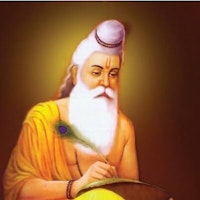Truth has many aspects. Infinite truth has infinite expressions. Though the sages speak in diverse ways, they express one and the same Truth.
Srila Vyasadeva

Truth Has Many Aspects
Topic: Truth, Law, & Principle
Truth has many aspects. Infinite truth has infinite expressions. Though the sages speak in diverse ways, they express one and the same Truth.
Ignorant is he who says, “What I say and know is true; others are wrong.” It is because of this attitude of the ignorant that there have been doubts and misunderstandings about God.
This attitude it is that causes dispute among men. But all doubts vanish when one gains self-control and attains tranquility by realizing the heart of Truth. Thereupon dispute, too, is at an end.
Śrīla Vyāsadeva (traditionally said to have been born at the end of the Dvāpara Yuga on an island in the Yamunā River—regarded in the Vedic tradition as a sage who continues to live into the present age, the Kali Yuga) is revered as the compiler of the Vedas and one of India’s greatest spiritual teachers. Also known as Vedavyāsa or Krishna Dvaipāyana Vyāsa, he is described as the son of the sage Parāśara and Satyavatī, born under extraordinary circumstances that earned him the name “Dvaipāyana,” meaning “island-born.” From his earliest years, Vyāsadeva displayed profound spiritual insight and devotion to truth. Guided by his father and other sages, he immersed himself in the study of the Vedas and in disciplined meditation, dedicating his life to ensuring that sacred knowledge could be preserved and transmitted in an age of declining spiritual awareness.
Seeing that oral transmission of the vast Vedic corpus had become increasingly difficult, Vyāsadeva divided the unified body of the Vedas into four parts—the Ṛg, Yajur, Sāma, and Atharva Vedas—so they could be more effectively taught and safeguarded. He is also regarded as the author of the Mahābhārata, one of the world’s most sweeping and influential epics, composed to communicate spiritual principles through narrative, history, and human experience. Embedded within it is the Bhagavad Gītā, a dialogue between Krishna and Arjuna that has become a timeless guide to duty, devotion, and inner realization. Vyāsadeva is further credited with compiling the Purāṇas and composing the Vedānta-sūtras, foundational texts exploring the nature of reality, consciousness, and liberation.
In his later years, despite completing an immense body of spiritual literature, Vyāsadeva is said to have felt a lingering sense of incompleteness. After reflecting deeply and receiving the counsel of the sage Nārada, he composed the Śrīmad-Bhāgavatam (Bhāgavata Purāṇa), emphasizing pure devotion (bhakti) to the Supreme as the highest path. In this work, he taught that ultimate realization is not achieved by intellect alone but through loving remembrance and selfless service to the divine presence within all beings. Śrīla Vyāsadeva’s life and writings continue to illuminate the spiritual path, offering seekers a vision of harmony between knowledge, devotion, and liberation—a bridge between profound philosophy and deeply lived spiritual experience.
Srimad Bhagavatam
Wilson, Andrew, editor. World Scripture - a Comparative Anthology of Sacred Texts. Paragon House, 1991, p. 39 [Srimad Bhagavatam 11.15].

Srila Vyasadeva

Srimad Bhagavatam 11.15
In the profound words of Srila Vasadeva, “Truth has many aspects. Infinite truth has infinite expressions. Though the sages speak in diverse ways, they express one and the same Truth,” there is an invitation to embrace the multifaceted nature of truth. This statement, deeply rooted in spiritual wisdom, acknowledges the vastness and complexity of truth, transcending the limitations of singular perspectives. It suggests that truth, in its infinite forms, cannot be confined to one person’s understanding or articulation. The sage recognizes that different paths and expressions can lead to the same fundamental truth, a concept that echoes through various spiritual traditions and philosophies. This realization fosters a sense of unity and respect among diverse beliefs, as it acknowledges that various approaches to understanding the divine or ultimate reality are but reflections of the same underlying truth.
Srila Vasadeva further enlightens us by highlighting the pitfalls of ignorance in his context passage, “Ignorant is he who says, ‘What I say and know is true; others are wrong.'” This statement addresses the human tendency to cling to personal beliefs as the sole bearers of truth, often leading to conflict and misunderstanding. It is a poignant reminder of the limitations of ego and the dangers of absolutism in matters of faith and understanding. In a world where divergent views often lead to discord, this perspective is a call for humility and openness. It emphasizes the importance of recognizing that one’s understanding of truth is just a part of a much larger, intricate tapestry of knowledge and experience. By encouraging self-control and the pursuit of inner tranquility, Srila Vasadeva points towards a transformative journey where the heart of Truth can be realized, leading to the resolution of disputes and a deeper comprehension of the divine.
Finally, drawing upon the teachings from Srila Prabhupada’s preface to Srimad-Bhagavatam, we find a reinforcement of these ideas. The emphasis on Srimad-Bhagavatam as a tool for re-spiritualizing society and understanding the ultimate source of creation resonates deeply with Srila Vasadeva’s message. Prabhupada’s work, while focusing on the transcendental knowledge of God, also sheds light on the notion that truth and divine understanding are not confined to a single narrative or interpretation. By presenting a comprehensive and step-by-step approach to spiritual knowledge, Prabhupada’s teachings encourage a careful and open-minded exploration of spiritual truths. This approach aligns with Vasadeva’s insight into the nature of truth, underscoring the idea that the path to divine realization and harmony in human society lies in recognizing and respecting the multitude of ways in which truth can be expressed and understood.
Srila Prabhupada’s preface to Srimad-Bhagavatam
Sri Krishna
Sri Krishna was born in northern India in approximately 3,228 BCE. The Puranas consider Sri Krishna’s life to mark the passing of the Dvapara age in to the Kali Yuga (current age).
Sri Krishna is the central figure of the Bhagavad Gita. Sri Krishna is widely considered by Hindus to be an Avatar―a direct descent of God. During the Battle of Kurukshetra, Krishna gave Arjuna the immortal spiritual discourse of the Bhagavad Gita―Krishna taught a spiritual path of wisdom, devotion and discrimination. Sri Krishna also popularised devotional bhakti yoga through his time with Radha and the Gopis in Vrindavan.
Additional Quotes from and About Sri Krishna
Resources
Related Quotes
Copyright © 2017 – 2026 LuminaryQuotes.com About Us